Call: (508) 790-8300
General & Family Dentistry
When you visit our experienced dentists and dental team at General Dentistry of Cape Cod, PC, we work hard to provide you with an experience that is comfortable and enjoyable. It is our goal to provide you with the high-quality, comprehensive dental care you need in a warm, relaxing atmosphere. Dr. Uzpurvis and Dr. Booth are pleased to provide general and family dentistry in Hyannis, Massachusetts, offering personalized care for patients of all ages. Our dental services include:
Dental Hygiene

Dental and oral health is very much the same. Problems can and will be detected early on, before the problems are increased to cause an extreme amount of pain, time, and money. We want to save you from unnecessary pain and/or costs. When you come to our office for dental hygiene in Hyannis, Massachusetts, you can expect:
- Thorough Exams and Cleanings
- Dental X-Rays
- Home Care (Instructions and Plans)
- Brushing and Flossing Instructions
Regardless of when you come to our office, our dentists and dental team are prepared to help repair all damage and perform the necessary treatments to prevent further damage and pain. Call us to set up an appointment with Dr. Uzpurvis and Dr. Booth, or stop by General Dentistry of Cape Cod, PC during office hours. We are always happy to help.
Appliance Therapy
TMJ Appliances
TMJ stands for the temporomandibular joints, which are the small joints in front of each ear that attach your lower jaw to your skull. They allow you to open and close your mouth, chew, speak, and swallowing.
There are different types of TMJ problems that respond to different methods of treatment. Our multi-specialty dentists are highly skilled in treating TMJ and can create a custom appliance to help alleviate your pain.
Snore Guard
Snore Guard is an anti-snoring device that helps to eliminate snoring before it starts. It is a jaw retaining mouthpiece that is fitted over your teeth and while it is in your mouth, it holds your lower jaw forward.
Night Guards
It’s estimated that close to 20% of adults suffer from the negative effects of grinding and clenching their teeth, often called bruxing. The main reason people clench and grind their teeth is due to stress. Clenching and grinding not only causes excessive wear on your teeth, but the activity can also cause your facial and neck muscles to become sore.
Dr. Uzpurvis and Dr. Booth can fit you with night guards – plastic mouthpieces that fit over your upper and lower teeth – to lessen the damaging effects of clenching or grinding your teeth.
Sports Guards
Do you or your children play sports? If so, a properly fitted sports guard (athletic mouth guard) is essential to keeping your smile healthy. This can help to prevent damage to your smile that can occur during athletic activities, such as a cracked tooth, a chipped tooth, a knocked-out tooth, or a damaged restoration.
For more information about getting a mouth guard in Hyannis, Massachusetts, we encourage you to contact our dentists at General Dentistry of Cape Cod, PC today.
Dental Bridges
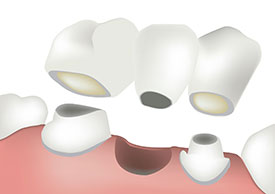
Dental bridges are another option for filling the space where a tooth once was. The devices can also go by the moniker of partial dentures and can either be removable or permanent. The three basic types of dental bridges are traditional, cantilever and a Maryland bonded bridge.
The removable option will consist of replacement teeth connected to a gum-colored plastic base with a metal framework to anchor the fake teeth. Permanent dental bridges are called fixed and are used replace one or more missing teeth by placing dental crowns on each tooth surrounding the vacant space and affixing the replacement directly into the crown. Ultimately the fixed bridge is cemented into position.
Bone Grafting
Typically when people think of bone grafting treatments, they don’t associate the process with the dentist. This area of medical science is usually associated with other physical ailments. On occasion, however, bone grafting treatment does become pertinent in dental science, usually in places where teeth have been missing for some period of time.
After you have lost a tooth and time has passed, the jawbone will deteriorate in such a way that restorative implants become nearly impossible. One of the many benefits of modern medical science is that via bone grafting treatments, human bone can be restored and grown when needed. Because of this, we can enhance your teeth and smile to full functionality and achieve optimal cosmetic appearance in your smile. If you have experienced bone loss and are interested in dental implants, our dentists may recommend a bone graft in Hyannis, Massachusetts, using bone taken from another part of your mouth or body, bone from a tissue bank, or a synthetic bone-like material. Dr. Uzpurvis and Dr. Booth will help you determine which of these options is best suited to your needs.
To learn more about bone grafting and how we can restore your smile, we welcome you to call or visit us at General Dentistry of Cape Cod, PC.
Dental Crowns
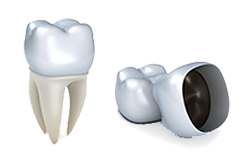
Before & After Crowns

Crown Lengthening
Most people have heard the term dental crown before. But fewer know what crown lengthening is or why you'd need it. Yet dental crown lengthening is often a required step in preparing your tooth for a dental crown.
Dental crown lengthening involves the removal of gum tissue, bone or both to expose more of a tooth's structure. Why would you need it? You might have broken a tooth at the gum line. Or you might just have a decayed tooth. Sometimes after your dentist removes the tooth decay, there isn't enough tooth structure left above the gum line to support a dental crown (or even a large tooth filling). Without enough structure to grab on to, ill-fitting dental crowns may cause chronic inflammation and irritation. Even worse, tooth decay may get in under the dental crown, creating the need for more dental treatment. You might even lose the tooth completely.
Although less common, crown lengthening may also be used cosmetically to treat what's called a "gummy smile." When an unusually large amount of gum tissue shows around the upper teeth, crown lengthening might help. Your dentist can expose more of your teeth, then sculpt your gum line to create the look you want.
Dentures and Partials
Using dentures to replace missing teeth is not only great for your oral health; it's a great way to look and feel younger! Today, there are a variety of natural-looking and comfortable dentures for patients who need to replace missing teeth. Made of a gum-colored plastic resin or acrylic base and either resin or porcelain replacement teeth, dentures are custom designed to fit your mouth. If you have several teeth or all teeth missing on the upper or lower jaw, full dentures may be your best option. Partial dentures, which can be either fixed or removable, are great for patients who have several missing teeth scattered along the upper or lower jaw.
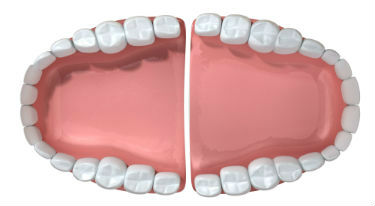
The process of getting dentures may take a few months and several dental visits. In some cases, however, same-day dentures are also possible. With same-day dentures, the dentures are created right in the dentist's office instead of at an offsite laboratory. Same-day dentures aren't for everyone, though. If your dentures require a lot of customization, same-day dentures may not be right for you.
Just as with your natural teeth, dentures require daily maintenance. With regular wear and tear, your dentures can last 5-7 years. During that time, you may need periodic denture relines to accommodate changes in the contours of your mouth. Regular denture relines involve resurfacing the base to ensure that your dentures fit and function perfectly. If you break your dentures, it's critical to bring them to your dentist for professional denture repair. Home denture repair kits can cause more damage and be even more costly to fix.
Periodontal Treatment
All is not lost if you have gum disease. The infection can be tricky, usually starting out with little to no pain or irritation. You might not even know you have the milder form of the disease, called gingivitis. Without gum treatment, it can develop into the more severe form, periodontitis. Fortunately, treatment for gum disease is available! The goals of gum disease treatment are to control infection, prevent tooth loss and keep the disease from damaging tissues.
If you've got gum disease, your dentist may provide gum treatment or you may be referred to a periodontist, a dentist who specializes in the diagnosis, prevention and treatment of periodontal disease. Treatment for gum disease depends on how far the condition has progressed and how well your body responds to therapy.
Gum disease is usually preventable. Just take care of your teeth! Proper oral hygiene is a good start: Brush regularly with a fluoride-containing toothpaste, floss every day and visit your dentist regularly.
If you think you need gum treatment, don't wait! Call our office today.
Post-Op Instructions
Depending on the different treatments and services performed, it is important to adjust your regular hygienic care and eating habits during various periods of healing and repair. It is also of the utmost importance that after your mouth and gums have healed, and all treatments have had time to adjust to your mouth, that you maintain good, consistent hygienic habits for your teeth. Maintaining good dental hygiene is essential to ensuring your smile heals properly and that it stays free from damaging conditions like tooth decay and periodontal disease.
After all the treatments, Dr. Uzpurvis, Dr. Booth, or the assistant at General Dentistry of Cape Cod, PC will be able to instruct you on the individual necessary post-operational instructions. Be certain to carefully follow these instructions so that your smile will heal quickly, properly, and comfortably. If you have any questions about any of the procedures, any of the long-term effects of our services, or our post-op instructions in Hyannis, Massachusetts, please do not hesitate to give us a call. Our dentists and dental team are willing and eager to answer your every question so that we can provide you with the right kind of dental health and the best kind of smile that you can have.
Root Canal Therapy
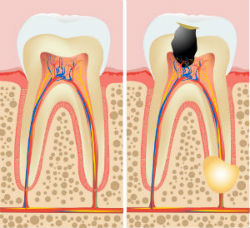
- Newly formed tooth decay can cause a leakage of bacteria into the root canal.
- The dental crown used to protect the tooth cracks, breaks or is placed too late, allowing new infection to enter the root.
- The roots weren't cleaned thoroughly or where missed completely -- it can be difficult to remove the infection in curved root canals and some of the canals may be too hard to see, causing them to remain untreated.
- The roots were incorrectly sealed or filled.
- The tooth was contaminated by saliva during the procedure.
Many dental patients experience some discomfort as their tooth heals following a dental procedure -- so how will you know if your root canal requires endodontic retreatment?
Discomfort that does not go away within a couple of days or an increase in pain could be signs that your root canal is reinfected. If the toothache remedies we prescribe don't give you any relief, it may be also be a sign of a problem.
You may not experience symptoms right away -- a failed root canal can happen months or even years after the original procedure is performed. If the infection travels to the bone, a dental abscess can form, causing swelling in the gums.
Gum Tissue Graft
Three different types of gum tissue grafts are typically performed. The graft procedures include:
- Connective-tissue grafts. This is the most common method used to treat root exposure. During the procedure, a flap of skin is cut at the roof of your mouth (palate) and tissue from under the flap, called subepithelial connective tissue, is removed and then stitched to the gum tissue surrounding the exposed root. After the connective tissue -- the graft -- has been removed from under the palatal flap, the flap is stitched back down.
- Free gingival grafts. Similar to a connective-tissue graft, free gingival grafts involve the use of tissue from the roof of the mouth. But instead of making a flap and removing tissue under the top layer of flesh, a small amount of tissue is removed directly from the roof of the mouth and then attached to the gum area being treated. This method is used most often in people who have thin gums to begin with and need additional tissue to enlarge the gums.
- Pedicle grafts. In this procedure, instead of taking tissue from the palate, it is grafted from gum around or near the tooth needing repair. The flap, called a pedicle, is only partially cut away so that one edge remains attached. The gum is then pulled over or down to cover the exposed root and sewn into place. This procedure can only be done in people who have plenty of gum tissue near the tooth.
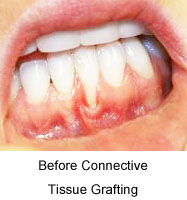
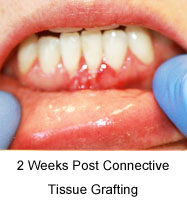
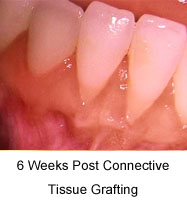
Tooth Extractions

The most common tooth extractions are usually wisdom tooth extractions, but your dentist may also remove a tooth if it's coming in at an angle, threatening the position of other healthy teeth or contributing to overcrowding in the mouth.
In some cases, a broken tooth may also need to be extracted, as well as teeth with significant tooth decay that cannot be treated by a root canal. Patients with advanced gum disease may be considered for tooth extractions as well. While it's your dentist's goal to do everything to save your natural tooth, in the end, removing a potentially harmful tooth can spare you time, money and discomfort.
